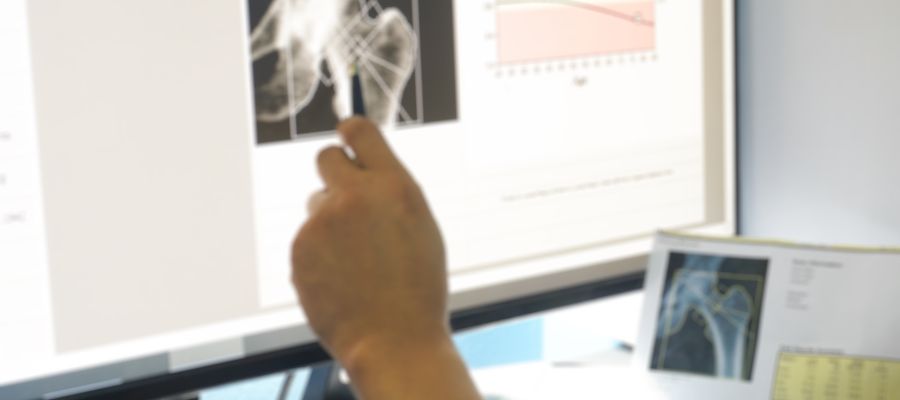Bone Density Test
Welcome to the Medical Office of Katy’s informative guide on “Bone Density Testing.” In this article, we will explore the significance of bone density testing, its purpose, how the test is conducted, when it is recommended, answers to frequently asked questions, and the importance of bone health assessment for individuals seeking to maintain strong and healthy bones.
What Is a Bone Density Test?
A bone density test, also known as bone densitometry or dual-energy X-ray absorptiometry (DXA or DEXA) scan, is a medical procedure used to measure the density and strength of bones. This test helps evaluate an individual’s risk of osteoporosis and assesses bone health by measuring bone mineral density (BMD).

Descriptions
Common aspects of bone density testing include:
DXA Scan: The most common method for bone density testing is the DXA scan. It uses low levels of X-rays to measure the mineral content and density of bones, typically in the hip, spine, or forearm.
Purpose: Bone density testing is used to:
Diagnose osteoporosis or determine an individual’s risk of developing it.
Assess bone health and the risk of fractures.
Monitor the effects of osteoporosis treatment.
Scoring: The results of a bone density test are typically reported as a T-score and a Z-score:
T-score: Compares an individual’s BMD to that of a young, healthy adult of the same sex. A T-score of -1 or higher is considered normal, while scores between -1 and -2.5 indicate low bone mass (osteopenia), and scores of -2.5 or lower suggest osteoporosis.
Z-score: Compares an individual’s BMD to that of individuals of the same age, sex, and body size. This score helps identify secondary causes of low bone density.
Frequency: The frequency of bone density testing depends on individual risk factors, age, and previous test results. Healthcare providers can provide guidance on appropriate testing intervals.
FAQs
Who should get a bone density test? Bone density testing is recommended for:
Postmenopausal women and men aged 50 and older.
Individuals with risk factors for osteoporosis, such as a family history of fractures, certain medical conditions, or long-term use of medications that affect bone health.
Is a bone density test painful? The test is painless and non-invasive. Patients lie still on an examination table while the scanner passes over the body.
Can men get osteoporosis? Yes, men can develop osteoporosis, and bone density testing can help identify individuals at risk.
Bone density testing is a valuable tool for assessing bone health, diagnosing osteoporosis, and determining fracture risk. At the Medical Office of Katy, we prioritize bone health assessment to support our patients in maintaining strong and healthy bones.
If you are concerned about your bone health, have risk factors for osteoporosis, or have received recommendations from your healthcare provider, it is essential to schedule a bone density test. Early diagnosis and appropriate interventions, such as lifestyle modifications and medications, can help prevent fractures and maintain bone strength throughout life. Your bone health and overall well-being are our top priorities, and we are here to provide you with the care and guidance you need.
OUR SERVICES
Beyond Symptoms to Sustainable Wellness


Chronic Disease Manahement
Astham, High Pressure, Diabetes, Colestores
From asthma and hypertension to diabetes and cholesterol management, trust our comprehensive care. Learn More


Weight Loss program
The Future of Weight Loss and Wellness.
Charting your path to a healthier tomorrow, where innovative weight management meets holistic well-being. Learn More


IV Infusion
Your Body's Best Boost
Experience the potent benefits of IV infusion, delivering essential nutrients straight to your system. Learn More

Treatment With Quality Care
Board Certifed Physicians and Nurses
We provide high-quality clinical care to our patients including correct patient identification, avoiding diagnostic errors, and preventing infections and other risks. The medical office of Katy ensures that all sensitive patient information related to their medical history or finances is kept secure to avoid any embarrassment or frustration.
Our medical staff has received comprehensive infection prevention training, which includes thorough patient screening and the use of personal protective equipment (PPE) when providing patient treatment. Every day, we follow CDC recommendations and safeguards, and our patients will always have the option of virtual appointments. Learn More

I absolutely loved Dr. Humera Naqvi. She is very knowledgeable, she listens to the patient, great communication. She makes you feel cared for. I highly recommend Dr. Humera Naqvi she has been the best doctor I’ve had the pleasure of meeting. My mother also follows up with her and she absolutely loves her.
Cynthia Picazo
WHY CHOOSE US
Patient-First Primary Care You Can Trust in Katy
A Community-Centric Approach
Medical Office of Katy focuses on delivering high-quality, patient-centered care using evidence-based treatment guidelines and modern diagnostic tools. Our experienced providers are trained to evaluate and treat a wide range of respiratory illnesses while prioritizing patient safety and comfort. We offer rapid testing and diagnosis to help guide treatment decisions quickly and accurately. Same-day appointments help reduce delays in care, allowing patients to receive treatment when symptoms first appear.
Primary Care in Katy
Comprehensive Traetment
Insurance Information
New Patients Formalities and Medical Refill
Get in Touch
Connect With Our Katy Primary Care Team Today
At Medical Office of Katy, we make it simple for patients to schedule appointments, ask questions, and access care when needed. Whether you are looking for a new primary care provider, need sick visit care, or want to schedule preventive screenings, our team is ready to help.
Our clinic is conveniently located in Katy, TX, making it easy for patients and families in nearby communities such as Fulshear and Richmond to access high-quality healthcare close to home. We are proud to serve patients across the greater West Houston area with reliable, patient-focused primary care services. We offer online appointment requests, phone scheduling, and secure patient portal access so you can stay connected with your care team anytime. We also accept most major insurance plans and are always welcoming new patients. Learn More



